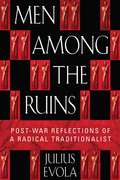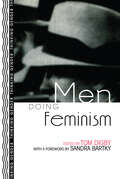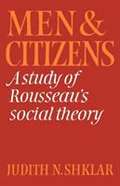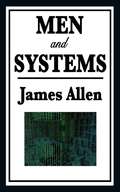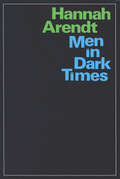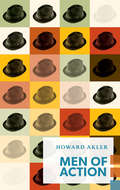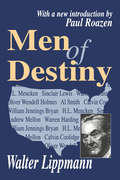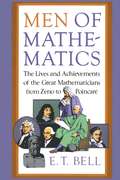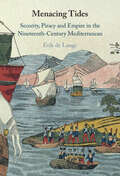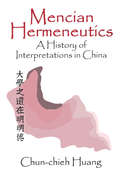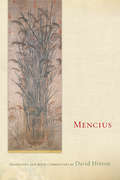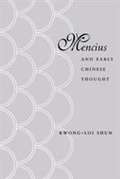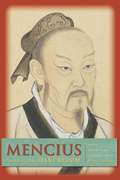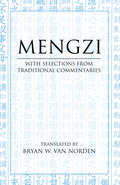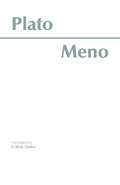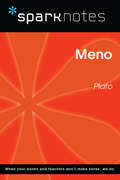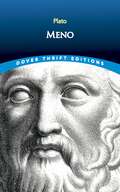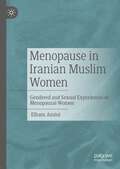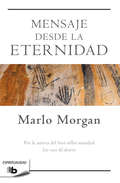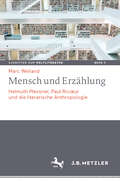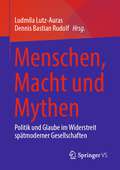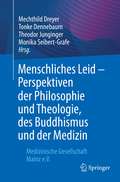- Table View
- List View
Men Among the Ruins: Post-War Reflections of a Radical Traditionalist
by Julius EvolaJulius Evola's masterful overview of the political and social manifestations of our time, the "age of decline" known to the Hindus as the Kali Yuga.• Reveals the occult war that underlies the crises that have become a prevailing feature of modern life.• Includes H. T. Hansen's definitive essay on Evola's political life and theory. Men Among the Ruins is Evola's frontal assault on the predominant materialism of our time and the mirage of progress. For Evola and other proponents of Traditionalism, we are now living in an age of increasing strife and chaos: the Kali Yuga of the Hindus or the Germanic Ragnarok. In such a time, social decadence is so widespread that it appears as a natural component of all political institutions. Evola argues that the crises that dominate the daily lives of our societies are part of a secret occult war to remove the support of spiritual and traditional values in order to turn man into a passive instrument of the powerful. Evola is often regarded as the godfather of contemporary Italian fascism and right-wing radical politics, but attentive examination of the historical record--as provided by H. T. Hanson's definitive introduction--reveals Evola to be a much more complex figure. Though he held extreme right-wing views, he was a fearless critic of the Fascist regime and preferred a caste system based on spirituality and intellect to the biological racism championed by the Nazis. Ultimately, he viewed the forces of history as comprised by two factions: "history's demolition squad" enslaved by blind faith in the future and those individuals whose watchword is Tradition. These latter stand in this world of ruins at a higher level and are capable of letting go of what needs to be abandoned in order that what is truly essential not be compromised.
Men Doing Feminism (Thinking Gender)
by Tom DigbyFirst published in 1998. Routledge is an imprint of Taylor & Francis, an informa company.
Men and Citizens: A Study of Rousseau's Social Theory (Cambridge Studies in the History and Theory of Politics)
by Judith N. ShklarThis book, first published in 1969, is widely regarded as one of the best studies of Rousseau's thought in any language. In it, Professor Shklar examines Rousseau's central concern: given that modern civilisation is intolerable and a return to the state of nature impossible, how is man to arrange his existence in society? Shklar organises the study around Rousseau's two conceptions of Utopia: the Spartan city and the autonomous family group. She emphasises the importance for Rousseau of psychological factors and shows how, when mediated through his images of authority and use of metaphor, they bring him to his notorious view that man is 'everywhere in chains'. In Shklar's view, Rousseau's conclusion is almost equally pessimistic: the chances are very remote that we can overcome the psychological obstacles to become both men and citizens.
Men and Systems
by James AllenThe unceasing change, the insecurity, and the misery of life make it necessary to find some basis of certainty on which to rest if happiness and peace of mind are to be maintained. All science, philosophy, and religion are some many efforts in search of this permanent basis; all interpretations on the universe, whether from the material or spiritual side, are so many attempts to formulate some unifying principle or principles by which to reconcile the fluctuations and contradictions of life.
Men in Dark Times
by Hannah Arendt“Each [essay is] a model of clarity, weight, gravity . . . each superbly centered on the moods, manners, works . . . of ten exemplary men and women” (Kirkus Reviews, starred review).“Dark times” is Brecht's phrase, and Hannah Arendt uses it suggest that those she writes about are not “mouthpieces of the Zeitgeist”, but, rather, that the routine repetitive horrors of the twentieth century form the substance of the dark against which their lives of illumination were lived. Containing essays from Dr. Arendt on Karl Jaspers, Rosa Luxemburg, Pope John XXIII, Isak Dinesen, Bertolt Brecht, Randall Jarrell, and others whose lives and work shed light on the early part of the century.
Men of Action (Exploded Views)
by Howard AklerThe problem of consciousness may just be a semantic one. The brain absorbs a sea of sensory input, the tiniest fraction of which reaches the shore of our awareness. We pay attention to what is most novel, most necessary at the time. At its most reductive, the word 'consciousness' refers to the synchronized firing of neurons across multiple areas of the brain, the mental experience of attending. But should consciousness be summed up simply by its subsconscious mechanism? I would prefer a more imaginative answer. After his father, Saul, undergoes brain surgery and slips into a coma, Howard Akler begins to reflect on Saul's life, the complicated texture of consciousness, and Akler's struggles with writing and his own unpredictable mind. With echoes of Paul Auster's The Invention of Solitude and Philip Roth's Patrimony, Men of Action treads the line between memoir and meditation, and is at once elegiac, spare, and profoundly intimate.
Men of Destiny
by Walter LipmannA great editorial commentator of the twentieth century, Walter Lippmann, was a major contributor to the central periodicals and journals of the age, including the Atlantic Monthly, Foreign Affairs, Harper's, the New Republic, Saturday Review, and Yale Review. Men of Destiny, a set of biographical essays on leading figures of Lippmann's day, is arguably the best single source for understanding the persons and the policies of the post-World War I period.In a series of vignettes, the reader is introduced into the lively world of Al Smith, Calvin Coolidge, William Jennings Bryan, H.L. Mencken, Sinclair Lewis, Warren Harding, Andrew Mellon, and Oliver Wendell Holmes. The collection offers a rare glimpse of the first truly modern generation of American politics and society, and also a type of serious, detached writing that presumes a literate audience, but also one not given over to bias and hostility.The magic of this volume, however, is not in its litany of figures great and small, but Lippmann's comprehensive understanding of the place of America in world affairs. His essay on American imperialism remains a classic: "All the world thinks of the United States today as an empire, except the people of the United States." His advice to Americans is not to continue being evasive and grandiose with the rhetoric of equality, but to recognize the changing conditions and get on with the task of rule in as honorable a state as is possible by a holder of power.In his perceptive essays on the League of Nations, the efforts to outlaw war through international law, debt and reparations policies, Lippmann appeals to "time and a sense of reality" in examining all matters political. This volume, graced with a new introduction by Paul Roazen, will enable readers now well into the first decade of a new millennium to do just that.
Men of Mathematics
by E. T. BellHere is the classic, much-read introduction to the craft and history of mathematics by E.T. Bell, a leading figure in mathematics in America for half a century. Men of Mathematics accessibly explains the major mathematics, from the geometry of the Greeks through Newton's calculus and on to the laws of probability, symbolic logic, and the fourth dimension. In addition, the book goes beyond pure mathematics to present a series of engrossing biographies of the great mathematicians -- an extraordinary number of whom lived bizarre or unusual lives. Finally, Men of Mathematics is also a history of ideas, tracing the majestic development of mathematical thought from ancient times to the twentieth century. This enduring work's clear, often humorous way of dealing with complex ideas makes it an ideal book for the non-mathematician.
Menacing Tides: Security, Piracy and Empire in the Nineteenth-Century Mediterranean
by Erik de LangeNew ideas of security spelled the end of piracy on the Mediterranean Sea during the nineteenth century. As European states ended their military conflicts and privateering wars against one another, they turned their attention to the 'Barbary pirates' of Algiers, Tunis and Tripoli. Naval commanders, diplomats, merchant lobbies and activists cooperated for the first time against this shared threat. Together, they installed a new order of security at sea. Drawing on European and Ottoman archival records – from diplomatic correspondence and naval journals to songs, poems and pamphlets – Erik de Lange explores how security was used in the nineteenth century to legitimise the repression of piracy. This repression brought European imperial expansionism and colonial rule to North Africa. By highlighting the crucial role of security within international relations, Menacing Tides demonstrates how European cooperation against shared threats remade the Mediterranean and unleashed a new form of collaborative imperialism.
Mencian Hermeneutics
by Chun-chieh HuangConsidered second only to Confucius in the history of Chinese thought, Mencius (371?-289 b.c.), was a moral philosopher whose arguments, while pragmatically rooted in the political and social conditions of his time, go beyond particular situations to probe their origins and speculate on their larger implications. His writings constitute a living tradition in China and the world at large. Sinological studies of Mencius have long emphasized philological and archaeological research, situating the texts mainly in Chinese history. Critical appraisal of the texts lends itself to Western traditions of interpretation.
Mencius
by Mencius D. C. LauMencius helped formulate a Confucian orthodoxy that helped China replace feudalism with a centralized government around 320 BC. This is part of the Four Books that make up the Confucian corpus.
Mencius
by David HintonThis ancient text records the teachings of Mencius (4th c. B.C.E.), the second originary sage in the Confucian tradition which has shaped Chinese civilization for over two thousand years. In a culture that makes no distinction between those realms we call the heart and the mind, Mencius was the great thinker of the heart, and it was he who added the profound inner dimensions to the Confucian vision. Given his emphasis on the heart, it isn't surprising that his philosophical method is very literary in nature: story and anecdote full of human drama and poetic turns of thought. Indeed, the text is considered a paragon of literary eloquence and style.Mencius' strikingly contemporary empiricism represented a complete secularization of the spiritualist concepts of governance that had dominated China for over a millenia. He invested the humanist Confucian vision with its inner dimensions by recognizing that the individual is an integral part of a self-generating and harmonious cosmos. He saw all the spiritual depths of that cosmology inside us, and this led to a mystical faith in the inherent nobility of human beings. In his chaotic and war-ravaged times, he was therefore passionate in his defense of the people. Indeed, he advocated a virtual democracy in which a government's legitimacy depended upon the assent of the people. Such is the enduring magic of the Mencian heart- full of compassionate and practical concern for the human condition, and yet so empty that it contains the ten thousand transformations of the entire cosmos.
Mencius And Early Chinese Thought
by Kwong-Loi ShunThe present work studies Mencius in the context of Chinese thought of his era, focusing on several key ethical concepts and contrasting Mencius's views on them with those of earlier thinkers from the Confucian and other schools of thought. These concepts, and the specific terms that define them, had a great influence on subsequent Chinese philosophy. The author closely examines these terms, showing how they were used in the Mencius and other texts. <P><P>For important passages in the Mencius, the book gives comparative evaluations of competing interpretations found in traditional Chinese commentaries, as well as contemporary translations and discussions. In the process of studying key terms and passages in the Mencius, this book also provides an insight into Mencius's views on a variety of subjects, including human nature, the ethical ideal, the process of self-cultivation, and the relation between self-cultivation and political order.
Mencius: The Great Learning, The Doctrine Of The Mear [i. E. Mean] Confucian Analects [and] The Works Of Mencius (Translations from the Asian Classics)
by MenciusKnown throughout East Asia as Mengzi, or "Master Meng," Mencius (391-308 B.C.E.) was a Chinese philosopher of the late Zhou dynasty, an instrumental figure in the spread of the Confucian tradition, and a brilliant illuminator of its ideas. Mencius was active during the Warring States Period (403-221 B.C.E.), in which competing powers sought to control the declining Zhou empire. Like Confucius, Mencius journeyed to one feudal court after another, searching for a proper lord who could put his teachings into practice. Only a leader who possessed the moral qualities of a true king could unify China, Mencius believed, and in his defense of Zhou rule and Confucian philosophy, he developed an innovative and highly nuanced approach to understanding politics, self-cultivation, and human nature, profoundly influencing the course of Confucian thought and East Asian culture.Mencius is a record of the philosopher's conversations with warring lords, disciples, and adversaries of the Way, as well as a collection of pronouncements on government, human nature, and a variety of other philosophical and political subjects. Mencius is largely concerned with the motivations of human actors and their capacity for mutual respect. He builds on the Confucian idea of ren, or humaneness, and places it alongside the complementary principle of yi, or rightness, advancing a complex notion of what is right for certain individuals as they perform distinct roles in specific situations. Consequently, Mencius's impact was felt not only in the thought of the intellectual and social elite but also in the value and belief systems of all Chinese people.
Mengzi: With Selections from Traditional Commentaries
by Bryan W. Van Norden MengziBryan Van Norden's new translation of the Mengzi (Mencius) is accurate, philosophically nuanced, and fluent. Accompanied by selected passages from the classic commentary of Zhu Xi--one of the most influential and insightful interpreters of Confucianism--this edition provides readers with a parallel to the Chinese practice of reading a classic text alongside traditional commentaries. Also included are an Introduction that situates Mengzi and Zhu Xi in their intellectual and social contexts; a glossary of names, places and important terms; a selected bibliography; and an index.
Meno
by Plato G. M. GrubeAbout G.M.A Grube's translations of Plato: "Unmistakably superior: more lucid, more accurate, more readable. Above all, they're lucidly adorned, unpretentious, and in translating Plato that counts a good deal. The prose is, as English prose, persuasive, cogent, and as eloquent as it can be without departing from the text. --William Arrowsmith
Meno (SparkNotes Philosophy Guide)
by SparkNotesMeno (SparkNotes Philosophy Guide) Making the reading experience fun! SparkNotes Philosophy Guides are one-stop guides to the great works of philosophy–masterpieces that stand at the foundations of Western thought. Inside each Philosophy Guide you&’ll find insightful overviews of great philosophical works of the Western world.
Meno: A New Translation From The Text Of Baiter, With An Introduction, A Marginal Analysis And Notes (Dover Thrift Editions)
by PlatoWhat is virtue? Can it be learned or is it innate? Is it possible to know things a priori (before experience)? In this important and influential Socratic dialogue, Plato addresses a wealth of philosophy's fundamental questions, including the difference between actually knowing something and merely maintaining a correct belief about it. The dialogue begins when Meno, a young aristocrat from Thessaly, confidently declares that he can define virtue—only to be reduced in short order to utter confusion, a fate common to those engaging in debate with Socrates. Meno's contention that a concept cannot be defined without knowledge of its nature leads to one of the most celebrated passages in the history of philosophy: Socrates asserts the doctrine of reincarnation, and by posing a mathematical puzzle to Meno's slave, demonstrates the existence of innate knowledge. This brief but profound dialogue, which forms the basis for subsequent examinations of a priori knowledge, appears here in the translation by the distinguished scholar Benjamin Jowett.
Menopause in Iranian Muslim Women: Gendered and Sexual Experiences of Menopausal Women
by Elham AminiThis book offers an original empirical study into the gendered and sexual experiences of Iranian Muslim women going through menopause. Using a biographical lifecourse lens, it explores the processes through which these experiences are shaped by hegemonic gender norms, as well as how these women express their agency. Centering the voices of Iranian Muslim women, this book links sexuality, ageing, and the body to the matter of menopause, conceived here as a gendered, embodied and lived phenomenon characterised both by cultural constraint and by individual reflexive body techniques. By considering gender and sexuality as vectors of power with internal politics, inequalities, and oppression alongside embodied practice, the author shows how the life course provides a trajectory of sex and sexuality that routes both in time, space, social and cultural context.
Mensaje desde la Eternidad
by Marlo MorganUn mensaje dirigido a todas las almas, sin diferenciar entre mujeres y hombres, para restaurar nuestra dimensión espiritual perdida a través del modo en que los aborígenes han vivido en comunión con la tierra, sus criaturas y sus congéneres. Beatrice y Geoff nacieron según la tradición aborigen, en contacto con la tierra que les da de comer; pero fueron sustraídos de su entorno y, separados, vivieron perdidos en el mundo blanco. Tras realizar el camino del desierto, Beatrice encontró en la tribu de los Auténticos la sabiduría de sus antepasados, el mensaje de la Eternidad... «Este mensaje va dirigido a todas las almas, estén donde estén, y su contenido es válido para todas ellas. Lo ha sido siempre, desde los albores de la humanidad, en los tiempos de las cavernas, hasta el día de hoy. No existe diferencia alguna entre lo femenino y lo masculino. Nuestra misión no consiste en el éxito material y mundano, sino que tiene unadimensión espiritual. [...] Estos principios han sido seguidos por mi pueblo en la nación del Outback desde el principio de la historia. Nunca hemos sido labradores, mercaderes o pastores, sino cosechadores, músicos, artistas y poetas. Vivimos en comunión con la tierra, con todas las criaturas y con cada uno de nuestros congéneres.»Marlo Morgan
Mensch und Erzählung: Helmuth Plessner, Paul Ricœur und die literarische Anthropologie (Schriften zur Weltliteratur/Studies on World Literature #9)
by Marc WeilandDer Mensch lebt von Natur aus in und mit Geschichten. Mit Erzählungen bestimmt er, als wer oder was er sich denkt und wer oder was er ist. Den damit verbundenen anthropologischen und subjektivitätstheoretischen Grundlagen und Funktionen des Erzählens geht die Untersuchung anhand einer systematischen Verschränkung der Philosophischen Anthropologie Helmuth Plessners mit der Erzähltheorie Paul Ricœurs sowie aktuellen literaturtheoretischen Ansätzen nach. Dabei zeigen Analysen zu Menschenbildern in Literaturen der (Post-)Moderne und Gegenwart, dass sich die jeweils vorgenommenen Bestimmungsversuche ebenso wie die wahrgenommenen Unergründlichkeiten auch auf die literarisch reflektierten Formen und Aneignungsweisen des Narrativen auswirken – und schließlich ein exzentrisches Erzählen erzeugen.
Menschen, Macht und Mythen: Politik und Glaube im Widerstreit spätmoderner Gesellschaften
by Ludmila Lutz-Auras Dennis Bastian RudolfDer Sammelband diskutiert unterschiedliche Glaubensformen, die gegenwärtig in spätmodernen Gesellschaften miteinander in Widerstreit geraten. Mit Blick auf zunehmende Polarisierungstendenzen werden Glaubensformen und belief systems entlang Yves Bizeuls These einer neuen gesellschaftlichen Konfliktlinie rund um Fragen kollektiver Identität beleuchtet. Neben traditionellen Formen religiösen Glaubens, welche zwischen fortschreitender Säkularisierung und neuer religiöser Radikalisierung changieren, werden mythische Glaubensformen untersucht, die, als Zugang zur Welt und als Autoritäten der Welterklärung, Potential für gesellschaftliche Disruption in sich tragen.
Menschliches Leid - Perspektiven der Philosophie und Theologie, des Buddhismus und der Medizin: Medizinische Gesellschaft Mainz e.V.
by Theodor Junginger Monika Seibert-Grafe Mechthild Dreyer Tonke DennebaumIn diesem Buch werden die Sichtweisen der Philosophie, der christlichen und jüdischen Theologie, des Buddhismus, der Medizin sowie der Psychologie und Psychotherapie auf das Leid der Menschen dargestellt. Das eigene und das fremde Leid gehören grundlegend zum Leben der Menschen dazu, ebenso wie Freude und Glück. Den körperlichen oder seelischen Belastungen können viele Ursachen zugrunde liegen und oft werden Fragen nach dem Warum oder dem Sinn gestellt. Betroffene hadern damit, dass ausgerechnet sie die Erfahrung von Leid machen müssen. Diese Fragen nach den Ursachen, der Erklärung und der Bedeutung von Leid sowie die Möglichkeiten der Linderung und der Bewältigung von Leid diskutieren die Autoren im Kontext ihrer jeweiligen Fachgebiete, so dass sich dem Leser eine breite, und interdisziplinäre Sicht auf das menschliche Leid eröffnet.Weiterhin wird die Perspektive eines unmittelbar von Leid Betroffenen durch seine einprägsame Schilderung des Erlebten vermittelt.
